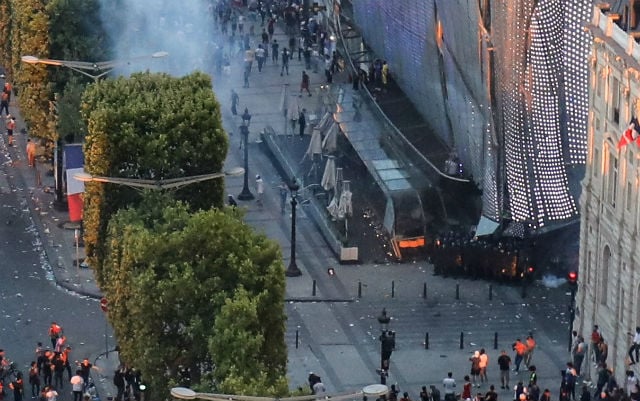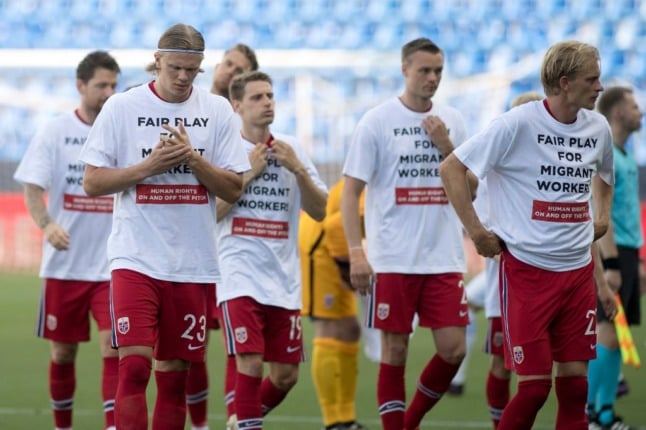The Champs-Élysées prepares to host hundreds of thousands of fans again for the French national team’s victory parade on Monday afternoon.
But some stores and restaurants were not taking any chances nor were they interested in the extra custom the crowds would bring. They decided to board up their stores and restaurants ahead of the parade over a repeat of Sunday night's looting and violence.
Prudente, la boutique SFR est protégée par des grands panneaux. pic.twitter.com/i5jhueg2oa
— Caroline Piquet (@CaroPiquet) July 16, 2018
“The SFR shop is being cautious by installing large panels to protect its storefront.”
SFR wasn't the only store not taking any risks as others took similar measures to protect their windows fearing a repeat of the vandalism that broke out on Sunday night when rioters looted the Publicis Drugstore.
Les magasins sur les #Champs-Elysées se baricadent. pic.twitter.com/Z9JzwkCDiC
— Lisa Haddad (@OuizaHaddad) July 16, 2018
Some restaurants like the Bistrot Romain simply closed up for the day after being ransacked on Sunday night.
Gros dégats au Bistrot Romain qui s'est fait dévaliser. “On nous a pris tous les alcools, cassé les caisses et les vitres. On a retrouvé du mobilier dehors. Résultat, on ferme aujourd'hui et on se cloître à l'intérieur, c'est honteux”, peste le chef de cuisine. pic.twitter.com/fi8anLNTQ4
— Caroline Piquet (@CaroPiquet) July 16, 2018
La boutique Orange aussi a pris les devants pour éviter les éventuelles casses. #ChampsElysees pic.twitter.com/P0UtibAoqp
— Caroline Piquet (@CaroPiquet) July 16, 2018
Some 4,000 police and security forces will be deployed across Paris once more in a bid to keep public order and prevent further disorderly behaviour.
As France awoke from a night of delirious celebrations throughout the streets of every town and city across l’Héxagone, no area was perhaps worse by hit by vandalism than the epicentre of the party itself: the Champs-Élysées.
Scenes of joy turned to violence on the famous 8th arrondissement avenue as dozens of youths looted a Publicis Drugstore and clashed with police.
They were spotted wearing ski masks as they broke in; they then left with bottles of wine and champagne, some smiling and filming themselves with cellphones.
Other vandals threw objects at police forces who responded with tear gas.
Despite the wild but mostly peaceful celebrations by hundreds of thousands of fans who flooded into the Champs-Élysées Avenue on Saturday night, the World Cup aftermath has left shattered shop windows, a burned down kiosk, rubbish containers knocked over and many torched vehicles.
Les services de propreté arrivent avenue Marceau. “En 1998, ce n'était pas aussi sale”, se souvient un agent qui travaille pr la ville de Paris depuis 37 ans. “Plus le temps passe, plus les dégradations sont importantes”. pic.twitter.com/5ycOmegEws
— Caroline Piquet (@CaroPiquet) July 16, 2018
This tweet by journalist Caroline Pique reads: “Cleaning services arrive at Avenue Marceau. “In 1998, it wasn’t this dirty,” recalls an agent who’s worked for Paris City Hall for 37 years. “The more time passes, the more the serious the damage is”.
The latest police reports suggest 102 people were arrested in central Paris, 90 of whom have been placed in police custody.
Cleaning up at Publicis Drugstore, which was sacked. #paris #france #champselysees #worldcup2018 #coupedumonde2018 pic.twitter.com/XlNyudQvY6
— Linda Hervieux (@lindahervieux) July 16, 2018
Shopkeepers and cleaning services were seen clearing the streets and storefronts of all the damage and rubbish left behind after Sunday night’s wild celebrations following France’s 4-2 win over Croatia in the World Cup final.
French police even had to disperse a crowd in front of the Champs-Élysées’s Nike shop on Monday morning as fans demanded the new French football jersey with two stars on it, one for each World Cup they have won. The store was closed and will remain so for the whole of Monday.
Intervention des forces de l’ordre pour disperser des clients venus acheter le nouveau maillot de l’équipe de France. « La boutique Nike est fermé, il faut descendre (l’avenue) », demande la police par mégaphone. pic.twitter.com/fbio9s2JTm
— Caroline Piquet (@CaroPiquet) July 16, 2018



 Please whitelist us to continue reading.
Please whitelist us to continue reading.
Member comments